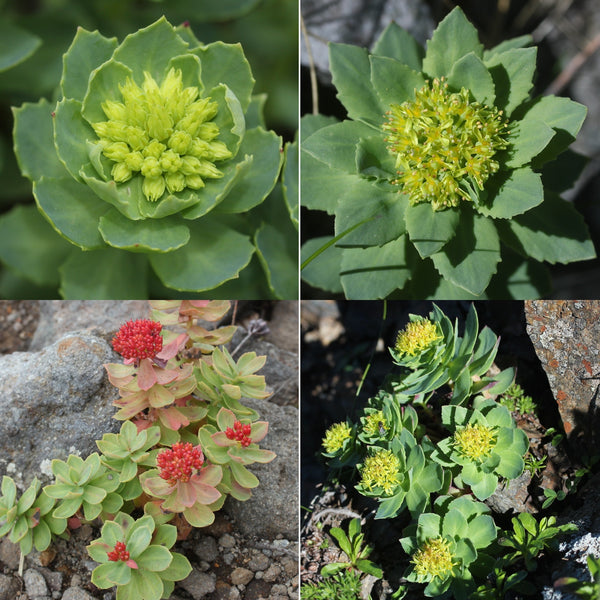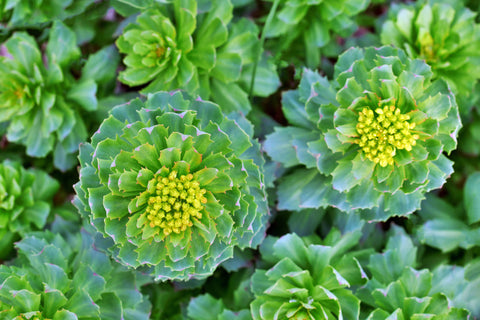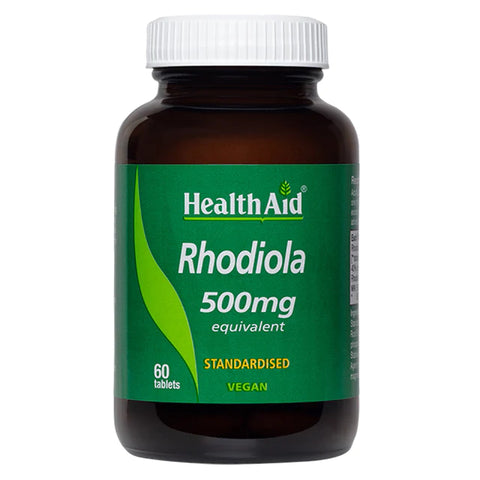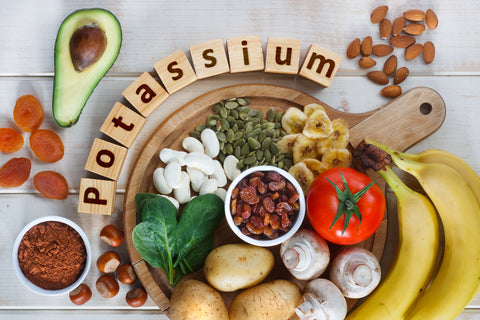Health Benefits Of Rhodiola Rosea
Rhodiola Rosea, also known as arctic root or golden root, is an apoptogenic herb from the Crassulaceae plant family which grows at high altitudes in the arctic areas of Asia and Eastern Europe. It has been known for its incredible abilities to help burn fat, control stress, impose a relaxing effect, increase energy levels and support cognition.

Active Ingredients
Rhodiola contains more than 40 types of chemical compounds. The most studied and important seem to be rosavin, salidroside, rhodiolin, rosarin and rosin. However, there are two chemical compounds which are believed to give Rhodiola rosea its unique properties. One is known as rosavin, and the other is salidroside. Both are believed to have influence on the nervous system and produce the adaptogen effects.
Rosavins are found in higher concentrations in Rhodiola than salidrosides, with approximately a 3:1 ratio. Various animal studies found that rosavin contributes to Rhodiola’s relaxing, adaptogenic, anxiolytic as well as stimulating effects (1).
Possible Health Benefits
Stress, Cortisol Levels and Adrenal Fatigue
Stress is almost everywhere and for many of us it is an unavoidable consequence of modern-day life. Fortunately, a range of nutrients and botanicals may help us during times of stress. Rhodiola rosea has been especially recognized as a great adaptogen able to support our ability to cope with mental and physical challenges of stressful lifestyle.
According to author and naturopathic physician Tori Hudson, Rhodiola can help to cope with adrenal fatigue, chronic fatigue, poor recovery from workouts and problems with physical/athletic performance (2).
Rhodiola may help balance cortisol levels and can be helpful for calming the body when the nervous system goes into “fight or flight” as a result of coping with everyday stressors (3).
Mood, Depression and Anxiety
Rhodiola has mood lifting properties because of its ability to help optimise levels of serotonin, GABA, dopamine and other neurotransmitters.
Rhodiola may help to increase the sensitivity of neurons associated with neurotransmitters serotonin and dopamine known for improving mood, focus, memory, pleasure, which makes them vital for preventing cognitive decline, and low mood. In animal studies, rhodiola was able to repair damaged neurons in the hippocampus region of the brain believed to be the centre for emotions, memory and the autonomic nervous system regulation (4). By increasing serotonin and dopamine sensitivity Rhodiola may improve mood and help overcome food cravings and various addictions (5,6).
A trial involving 80 participants found that taking a dose of 200 mg of Rhodiola twice daily demonstrated a “significant reduction in anxiety, stress, anger, confusion and depression in 14 days and a significant improvement in total mood.” In addition, Rhodiola supplementation was shown to have a “favourable safety tolerability profile.” (7).
Physical and Mental Energy
Apart from promoting adrenal function and feeling of calmness and relaxation, Rhodiola has been also traditionally used to aid cognitive functions of the brain and physical strength. It is even believed that during the cold war it was secretly used by Russian military officers, cosmonauts and Olympic athletes. Dr. Utkin, a Russian botanist and nutritionist, demonstrated in the early 1930s that Rhodiola root increased physical endurance.
The Sherpa people used Rhodiola to help them climb at high altitudes and even to conquer Mt. Everest, while the Vikings also had a custom to consume its roots to enhance physical strength.
Rhodiola helps increase stamina and physical endurance by increasing red blood cell count (it boosts EPO, also known as erythropoietin, which stimulates RBC production) and lowering oxidative damage (8). Since red blood cells carry oxygen to muscles and brain, having a higher RBC count dramatically increases energy levels and improves physical and mental performance.
A study performed on rats found that Rhodiola may increase endurance as it significantly increased energy allowing the animals to swim 25 percent longer. It is believed that the effect was due to the Rhodiola’s ability to increase cellular energy (ATP) production (9).
Recovery Of Muscle After Extensive Exercise
Rhodiola is believed to increase the levels of the enzymes and proteins important to the recovery of muscle after extensive exercise. According to a 2004 study published in the International Journal of Sports Nutrition and Exercise Metabolism, Rhodiola rosea has demonstrated to have anti-inflammatory benefits that improved endurance and helped rapid recovery of muscles after exercise (10).
Slimming & Diabetes
Rhodiola supports weight loss and improves our ability to burn bad visceral/belly fat responsible for type 2 diabetes and insulin resistance.
Rhodiola and metformin have similar effects because both activate increase the body’s sensitivity to insulin. For this reason, if you are taking metformin, talk first to your doctor before supplementing with Rhodiola (11,12,13).
Animal studies have found that Rhodiola may reduce visceral white adipose tissue and increase hypothalamic norepinephrine to help prevent obesity (14). Researchers believe that rosavin in Rhodiola is responsible for triggering a fat-burning response as it helps normalize cortisol levels.
Rhodiola may also weaken cravings for unhealthy comfort foods (high in refined sugar and bad fat) and delay fat-accumulation that is associated with high cortisol levels (especially the visceral fat found around the abdomen).
It is believed that rosavin may work by stimulating an enzyme called “hormone-sensitive lipase,” responsible for breaking down fat that is stored in adipose tissue.
ADD and ADHD
Some physicians recommend Rhodiola for individuals with ADD and ADHD because of its ability to improve focus.
When To Take Rhodiola
Ideally, Rhodiola should be taken about 15-30 minutes before meals. Higher intake should be divided into two or more separate dosages to improve the absorption and effectiveness.
Side Effects and Precautions
Rhodiola has been found to be generally well-tolerated by most people.
People on medications are encouraged to consult their doctor first before using Rhodiola.
Rhodiola and metformin have similar effects because both activate increase the body’s sensitivity to insulin. For this reason, if you are taking metformin, talk first to your doctor before supplementing with Rhodiola (15,16).
Related Articles
- What is Stress and How to Cope With it
- Adrenal Fatigue
- Ashwagandha (Withania somnifera)
- Ginseng for Less Stress and Better Brain Function
References
- Adaptogenic and central nervous system effects of single doses of 3% rosavin and 1% salidroside Rhodiola rosea L. extract in mice - PubMed (nih.gov)
- Rhodiola-Depression « Dr. Tori Hudson, N.D. (drtorihudson.com)
- [Plasma beta-endorphin and stress hormones in stress and adaptation] - PubMed (nih.gov)
- Herbal Medicine for Anxiety, Depression and Insomnia - PMC (nih.gov)
- HerbalGram: Rhodiola rosea: A Phytomedicinal Overview
- Rhodiola rosea versus sertraline for major depressive disorder: A randomized placebo-controlled trial - PubMed (nih.gov)
- The Effects of Rhodiola rosea L. Extract on Anxiety, Stress, Cognition and Other Mood Symptoms - PubMed (nih.gov)
- Rhodiola rosea as antioxidant in red blood cells: ultrastructural and hemolytic behaviour - PubMed (nih.gov)
- Effect of extracts from Rhodiola rosea and Rhodiola crenulata (Crassulaceae) roots on ATP content in mitochondria of skeletal muscles - PubMed (nih.gov)
- Acute Rhodiola rosea intake can improve endurance exercise performance - PubMed (nih.gov)
- When Anti-Aging Studies Meet Cancer Chemoprevention: Can Anti-Aging Agent Kill Two Birds with One Blow? - PMC (nih.gov)
- Metformin inhibits estrogen‐dependent endometrial cancer cell growth by activating the AMPK–FOXO1 signal pathway - PMC (nih.gov)
- Salidroside ameliorates insulin resistance through activation of a mitochondria-associated AMPK/PI3K/Akt/GSK3β pathway - PMC (nih.gov)
- Citrus aurantium and Rhodiola rosea in combination reduce visceral white adipose tissue and increase hypothalamic norepinephrine in a rat model of diet-induced obesity - PMC (nih.gov)
- When Anti-Aging Studies Meet Cancer Chemoprevention: Can Anti-Aging Agent Kill Two Birds with One Blow? - PMC (nih.gov)
- Metformin inhibits estrogen‐dependent endometrial cancer cell growth by activating the AMPK–FOXO1 signal pathway - PMC (nih.gov)
Sources
- https://www.ncbi.nlm.nih.gov/pmc/articles/PMC4385215/
- https://www.ncbi.nlm.nih.gov/pubmed/22228617
- https://www.greenmedinfo.com/article/rhodiola-cardioprotective-and-has-anti-stress-activity
- https://adaa.org/about-adaa/press-room/facts-statistics
- https://www.ncbi.nlm.nih.gov/pmc/articles/PMC4385215/
- https://www.researchgate.net/publication/20204439_Plasma_beta-endorphin_and_stress_hormones_in_stress_and_adaptation
- https://www.ncbi.nlm.nih.gov/pmc/articles/PMC4968082/
- https://www.mentalhealthamerica.net/rhodiola-rosea
- https://www.ncbi.nlm.nih.gov/pubmed/28219059
- https://pdfs.semanticscholar.org/5bd2/a2131f9def06b62b7e8ee25453e58eebbe45.pdf
- https://www.nationalgeographic.com/people-and-culture/food/the-plate/2016/08/long-before-doping-scandals–russians-were-studying-performance-/
- https://www.ncbi.nlm.nih.gov/pubmed/20541529
- https://www.ncbi.nlm.nih.gov/pmc/articles/PMC6208354/
Any information or product suggested on this website is not intended to diagnose, treat, cure or prevent any medical condition. Never disregard medical advice or delay in seeking it because of something you have read on this website. Consult your primary healthcare physician before using any supplements or making any changes to your regime.





